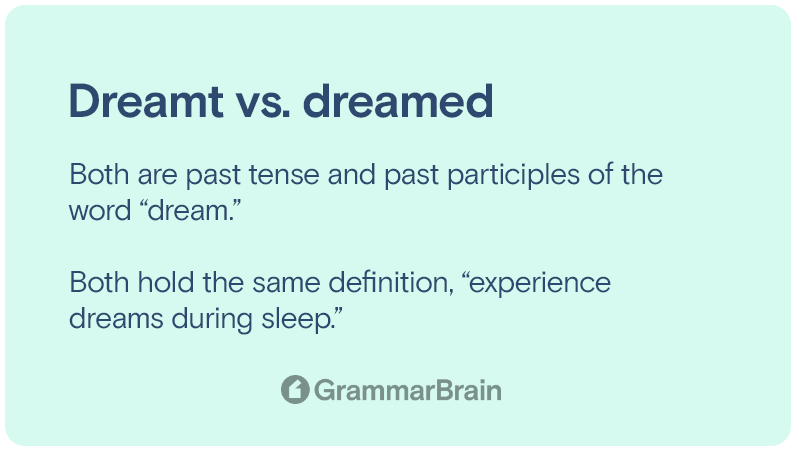Is it dreamt or dreamed? A lot of people don’t know ‘dreamt’ and ‘dreamed’ are both past tense forms of ‘dream’. Interestingly, ‘Dreamt’ is more popular in England, whereas ‘Dreamed’ is more popular in other commonwealth countries, including North America.
Apparently, ‘dreamed’ is used more when referring to sleep. On the other hand, ‘Dreamt’ pops up when the context is figurative in nature i.e. while connoting ‘hope.’

Differences between ‘Dreamed’ & ‘Dreamt’
Whether you prefer using ‘dreamed’ or ‘dreamt’ depends mainly on where you live. The thing is, there is not much of a difference between the two apart from the stylistic difference.
Some writers also prefer using ‘dreamed’ when duration is important. For example, in the sentence – “The cat dreamt of fishes last night,” – the aspect of duration is absent. On the other hand, if we say – “The cat dreamed of fishes all night,” – the aspect duration is palpable here.
Songwriters can also prefer one over the other based on the melody or rhythm created by the composer. The storytelling aspect of a write-up can also influence whether ‘dreamed’ is used in place of ‘dreamt’ and vice versa.
| Word | Definition |
| Dreamed (past tense, past participle) | experience dreams during sleep. |
| Dreamt (past tense, past participle) | experience dreams during sleep. |
What is the meaning of ‘Dreamt’?
It is simply a past tense and past participle of ‘dream‘, also known as the British version. You can consider this term to be an irregular verb, as it has a (-t) instead of a (-d) or (-ed).
Certain writers might consider ‘dreamt’ to have a unique flair to it as it has an unconventional spelling & ending. They might use this term to accentuate an accent, mood, or sound – which would not be possible by using ‘dreamed’.
Example sentences using ‘Dreamt’
Let’s look at a few examples where ‘dreamt’ is in use instead of ‘dreamt‘:
- He’d often dreamt about his brother and his family, but he’d never talked to him directly.
- As I parked in my barn, the beautiful little girl I’d dreamt about began to squirm and awaken.
- Two nights before, I dreamt of being confronted by a savage dragon, and it evoked terror in me.
- Jimmy dreamt of a path paved with gold and a stairway which led to the truth.
- She dreamt of what life with Robert might’ve been like, away from the war and betrayal.
What is the meaning of ‘Dreamed”?
It is a more commonly used past tense & past participle form of ‘dream’, commonly used across all English-speaking nations except Britain. ‘Dreamed’ is a regular verb as it ends with a conventional (-ed), instead of a (-t ).
Many writers might consider ‘dreamed‘ to be a more practical word and can use it to sound more modern, as it is the normalized version.
Example sentences using ‘Dreamed’
- Michael never dreamed that our firm would expand its business to the U.S.
- Such things as smartphones and computers could not have been dreamed of fifty years ago.
- We dreamed of ten thousand subscribers but succeeded with a mere tenth of this number.
- It is a strange feeling that creeps over you when you are standing in front of somebody you dreamed about last night.
- You’re the only woman who doesn’t remember what she dreamed after waking up.
Conclusion
In a nutshell, you can use ‘dreamt’ to sound more eloquent and profound while limiting the feel of duration in a given sentence.
On the other hand, ‘dreamed’ can be used to keep things simple and formal. The logical approach is to use both to avoid repetition.
Alternating between the two while writing a long essay could be quite useful.
FAQs
Is it “I dreamt” or “I dreamed?”
Is it “have always dreamed” or “have always dreamt?”
For example, if saying something like, “I have always dreamed of having a large house in the woods.” That would be correct. Although, using “dreamt” is considered acceptable as well.
What is the past participle of “dream?”
Dreamt and dreamed are both the past tense and past participle words for the root word “dream.”
Is it “have you ever dreamed” or “have you ever dreamt?”
Technically, “have you ever dreamt” would be more grammatically correct. Although in this sentence, both “dreamt” and “dreamed” would be considered grammatically acceptable.
Inside this article
Fact checked:
Content is rigorously reviewed by a team of qualified and experienced fact checkers. Fact checkers review articles for factual accuracy, relevance, and timeliness. Learn more.
Core lessons
Glossary
- Abstract Noun
- Accusative Case
- Anecdote
- Antonym
- Active Sentence
- Adverb
- Adjective
- Allegory
- Alliteration
- Adjective Clause
- Adjective Phrase
- Ampersand
- Anastrophe
- Adverbial Clause
- Appositive Phrase
- Clause
- Compound Adjective
- Complex Sentence
- Compound Words
- Compound Predicate
- Common Noun
- Comparative Adjective
- Comparative and Superlative
- Compound Noun
- Compound Subject
- Compound Sentence
- Copular Verb
- Collective Noun
- Colloquialism
- Conciseness
- Consonance
- Conditional
- Concrete Noun
- Conjunction
- Conjugation
- Conditional Sentence
- Comma Splice
- Correlative Conjunction
- Coordinating Conjunction
- Coordinate Adjective
- Cumulative Adjective
- Dative Case
- Determiner
- Declarative Sentence
- Declarative Statement
- Direct Object Pronoun
- Direct Object
- Diction
- Diphthong
- Dangling Modifier
- Demonstrative Pronoun
- Demonstrative Adjective
- Direct Characterization
- Definite Article
- Doublespeak
- False Dilemma Fallacy
- Future Perfect Progressive
- Future Simple
- Future Perfect Continuous
- Future Perfect
- First Conditional
- Irregular Adjective
- Irregular Verb
- Imperative Sentence
- Indefinite Article
- Intransitive Verb
- Introductory Phrase
- Indefinite Pronoun
- Indirect Characterization
- Interrogative Sentence
- Intensive Pronoun
- Inanimate Object
- Indefinite Tense
- Infinitive Phrase
- Interjection
- Intensifier
- Infinitive
- Indicative Mood
- Participle
- Parallelism
- Prepositional Phrase
- Past Simple Tense
- Past Continuous Tense
- Past Perfect Tense
- Past Progressive Tense
- Present Simple Tense
- Present Perfect Tense
- Personal Pronoun
- Personification
- Persuasive Writing
- Parallel Structure
- Phrasal Verb
- Predicate Adjective
- Predicate Nominative
- Phonetic Language
- Plural Noun
- Punctuation
- Punctuation Marks
- Preposition
- Preposition of Place
- Parts of Speech
- Possessive Adjective
- Possessive Determiner
- Possessive Case
- Possessive Noun
- Proper Adjective
- Proper Noun
- Present Participle
- Prefix
- Predicate



